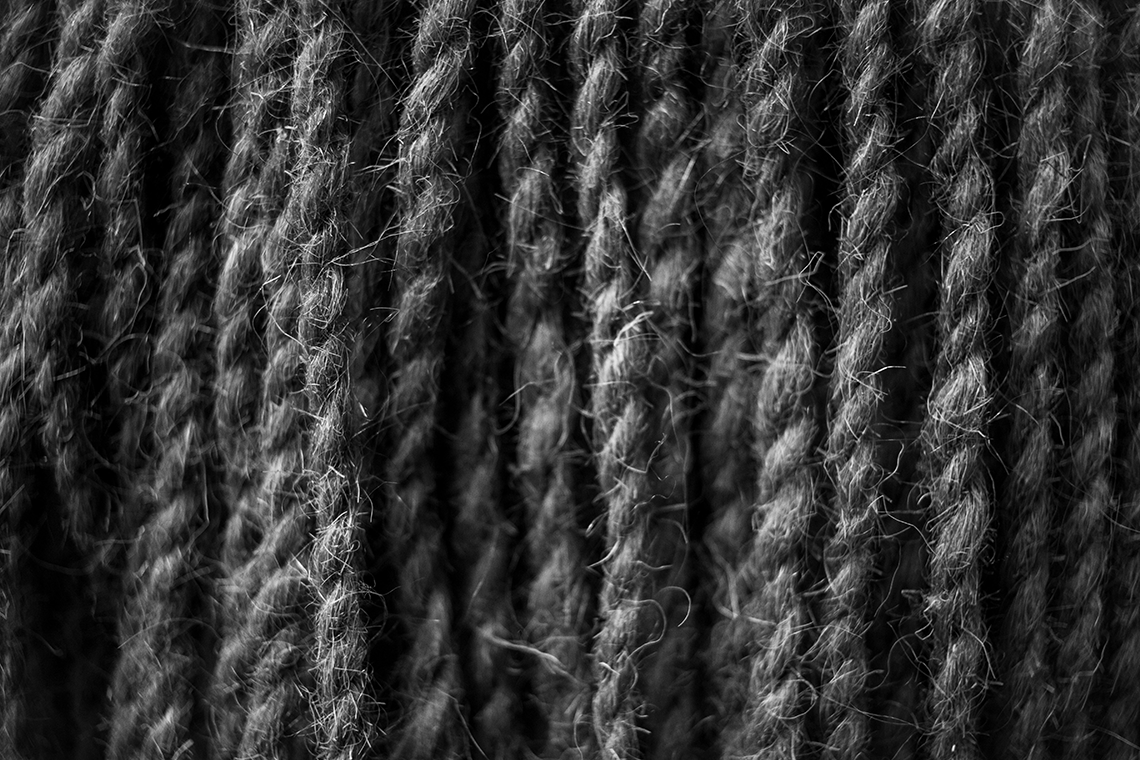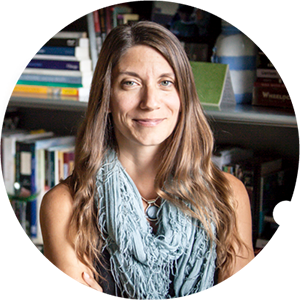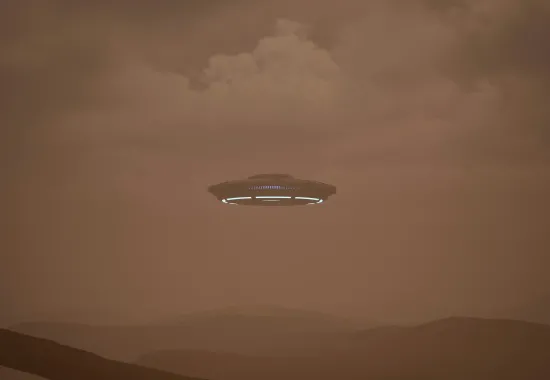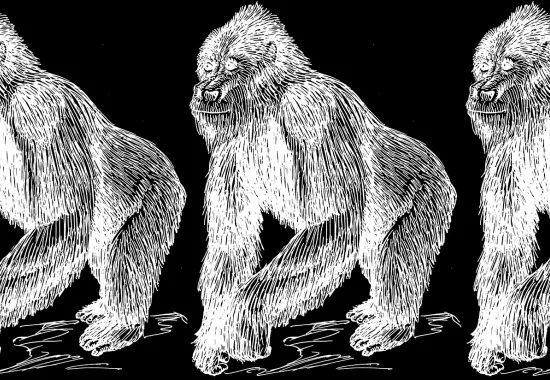Why to Crochet
The first time I remember seeing an erect penis, I was twelve, though memory me feels even smaller. I was sitting on a beached log, bare feet buried in warm sand a mile down shore from the house where I grew up, facing the bay and all I couldn’t see beyond it. The water’s edge was my safe place, but this wasn’t my backyard. I had stopped out of sight of the road to sneak a cig and left my bike in the woods behind me. It must’ve been summer—sunny, pleasant, yet the light’s glare and slight waves breaking made it hard to see or hear him before he was so close, so naked, so aroused, so alone, holding clothes in his hand, coming toward me. My heart buckled. I flicked my cigarette and ran. I had seen a man before (from a very early age, in fact, it was my job to listen for the water to stop, for Dad to yell, Okay, Lis! so I could run down the hall to the bathroom to hand him his towel after a shower, which I didn’t find strange then, since it was one of many rituals that made me his and him mine), but this guy was a silhouette. He was sauntering. I want to say he was smirking like a threat, but could I really see his face? It’s hard enough to run in sand in play. In danger, it is terror. I couldn’t turn my bike fast enough, tires stuck in the sand. I gasped for air, wondering if he was behind me. Why he was there. Why he wanted me to see him. If he wanted me to more than see him.
•
Crocheting isn’t just for eleven-year old prodigies chaining afghans as if for the apocalypse in a room doused floor to ceiling in yarn, nor is it for Midwestern ladies saying toast like O’s were born to die in their noses, though surely we have all enjoyed the photographic absurdity that is men posing in form-fitted crocheted shorts with ass pockets. Crocheting means a sustained connection for the duration it takes to unravel a skein of sturdy thread strategically coiled until it is entirely transformed into a demonstration of your attention and effort and care. It requires focus and quiet devotion to detail. It is order and mindlessness. Crocheting erases time, or it erases me from time, though for a long time I didn’t have time to spend erasing time, as I juggled single motherhood with teaching and studying from a BA to a PhD, but after a twenty-plus year hiatus, I found myself crocheting twenty-plus scarves day after day over the course of a couple months and mailing them to women who are important to me all around the country. I just can’t stop making them, I told Kendra in a rather tame session, as our sessions had become that autumn after a dam-breaking session. She smiled the way she smiled when I told her I was starting adult ballet in midlife. Well, that makes sense, she said, crocheting is EMDR. My body’s natural knack for tending trauma pleases her, though I’m troubled by my body’s need.
•
Let me begin again by saying what I don’t remember, so together we can doubt me from the start. I don’t remember what happens past my uncle’s hand running up my thigh. I don’t know why I was home alone when I had a fever or why he was sitting on the edge of the orange couch where my mother had always been when I was ill. I don’t know if I was eight or nine. I don’t remember ever telling anyone, even after my emotional surrogate mom Linda said that when I was fifteen, I told her—said he was a bad man, to never trust him with young girls—and then I started weeping until my dad walked in, and I retreated to freeze. I don’t remember if my parents ever found out about the party my sister threw while they were gone for the weekend, celebrating their divorce, or if they knew I nearly drank myself to death, or about the next party at the next house where we lived with a new man and Tina left me alone, in charge at ten years old, while she went to get a burger. I don’t remember how he got into my room for all his banging on my door, trying to force my locked knob. I don’t remember him spilling the raspberry brandy on my ivory carpet near the head of my bed, so far from the door I cannot see opening no matter how I tilt my head. I don’t remember if Tina held me or yelled at me or looked troubled as she scrubbed hard with both hands, hoping to erase that blood colored stain.
Knitting is ancient and terrifying—navigating two needles, holding so many open stitches so long. Crocheting is a much younger form of creation, but each time you wield your hook you lock a loop in place like a suture.
•
I learned to crochet the year I had my first abortion, the year before I got pregnant with my first son. I was seventeen and working at All City Communications, an answering service run by women. During high school, I’d accrued more absences than attendances, earning nine of the twenty-two credits needed to graduate, so I completed my equivalency diploma through the alternative high school program, which better fit my lifestyle of waking and baking, skating by on defiance and a deep, abiding anger for the world, for the way I’d lost my mother to loss and vodka, stuffing my own sadness as I could. By then I had surrounded myself with boys because girls, I decided, were catty bitches who’d turn on me in pairs after I’d trust them blindly, as I thought I could. Boys had simpler intentions and respected my scrappiness. Dad was my best friend. We’d smoke pot and talk for hours, but I knew even he could turn quicker than a girl if the principal called to say I was a fuckup, which meant he was a fuckup. Everyone was broken. A boy claimed to love me but broke me down to build himself up. Girls were mean, women weak. The All City women were the first to believe in me, to nurture me. They taught me to make afghans and baby clothes, giving me a sense of purpose that seemed gift enough, though now, twenty years later, I can see how they were my first red tent, sheltering me so I could begin healing.
•
The first time I had sex I didn’t want to. I was sixteen. All my friends had done it. Some started as early as twelve, but I wasn’t ready. Jesse and I had been dating over a year, so he was ready enough for both of us. Jesse lay on top of me in our friend Andy’s bed while he and Tammy, his girlfriend and one of my oldest friends, drank in the living room, waiting for Jesse and I to do it. Everyone knew it would be my first time. I loved Jesse. Loved being with him and making out, but I said no. Again. I don’t recall all he said not in sweetness but in ridicule to guilt me into submission, but I remember Tammy coming in the room after he left angry. She sat at the edge of the bed and as I type I see her at that edge as Uncle Eddy sat at that edge of our orange couch, and I want to say she rested her hand on me, and I want to bust through time’s door to tell myself it’s okay to say no. Tammy had been in my kindergarten class. She lived with me for a while when things were too bad at home. She saved me from being beaten once. She taught me to use a tampon. I loved her like a sister. It’ll be okay, she said, just get it over with. She left and sent Jesse back in. The moments passed in a blur I can’t say involved pain but definitely held no pleasure and music played though only Jesse ever remembered the song. All I see is Andy coming in, teasing me, as I stand from his bed so he can check his sheets for blood.
•
Knitting is ancient and terrifying—navigating two needles, holding so many open stitches so long. Crocheting is a much younger form of creation, but each time you wield your hook you lock a loop in place like a suture. Continuity, fluidity, and isolation as one. A single stitch can live on its own even if a stitch next to it comes undone. The whole doesn’t have to be ruined. An afghan can be missing a stitch yet can remain intact, and I’m reminded of how a juniper tree will kill part of itself to save the whole in a dry time. On the other hand, even if you remove one stitch—one problematic part—the others can remain. I can’t see the first baby blanket I crocheted, but I see myself jumping from my crib onto my beanbag to get to my mother. I can’t say what happened with his hands or his, but I can draw the hands of the witch who lived under my bed and kept me awake at night, the way it felt to stand on the edge and leap toward the door beyond her reach to stop my dad from beating my mom. I don’t know what happened to the duffel that held every pattern, hook, and stray bit of yarn when I moved from MI to UT, but I can still see its blue and his black hair dry as dead grass and that deep stain on my carpet like the birth mark that faded from my backside before I was old enough to shave my legs, and I know how a body creates its own language for the sensation of gone.
•
I didn’t bleed until I was fourteen. I never let a boy touch me down there until I was sixteen. Yet at thirteen, I found myself itching so much I’d rubbed myself raw, clawing in my sleep. I finally broke down and told my mother, who was the sort of woman who bathed daily because a shower couldn’t make her clean enough—she needed to soak in scalding water. I don’t recall the face she made or her exact words, but I can feel them in my chest—the disgust, the mistrust, the accusation. Who have you let touch you? What have you done? Just like that I was dirty, broken, no longer her girl. She took me to my pediatrician, who gasped when she saw my spread legs. Surely she knew how much pain I’d endured the past weeks. The girl has a very bad yeast infection, she told my mother, and her hymen is intact. Still my mother worried her boyfriend Curt—who beat her mercilessly and loved whiskey and picked fights with me at dinner so he could eat my food and threw knives at me and blasted country music all night while I tried to sleep for school and played guitar and begged me to sing because he loved the way I sang—had hurt me. As much as I hated Curt, he hadn’t hurt me that way. Maybe she needed to believe he’d broken me to justify choosing a bottle over a daughter when a year later she sent me to live with Dad—to convince herself she protected me even if she couldn’t make either of us safe.
•
The first time we try EMDR, Kendra tells me to close my eyes and imagine a pleasant place. I feel like an idiot, wearing 80s headphones, holding tiny, vibrating paddles like I’m ready to play a video game, but I try to be at the beach. I conjure sunlight. I reach to hear waves, to feel warm breeze and sand and then my uncle—his coarse black hair, his square 70s glasses, his slight smile and his hand running up my thigh—devours the beach, and I’m eight, maybe nine, looking at his hand, his face, the orange couch in our living room where I’ve been resting with a fever, which is all that I know, all that I’ve always known but have forgotten and am suddenly remembering, and I jerk and shake my head as if to clear the visual from my mind and look at Kendra and see in her face what she sees in mine, how terribly wrong things went in my most beautiful place. I tell her what I know and despair for all I don’t—why I was home alone, why he was allowed to be there with me, given all my parents had known about him, what happens beyond his hand on my thigh and why it all becomes sunlight pouring through the bay window that I can see but cannot feel lying on my back or what season it is or why I want to believe it is summer so I can feel the grass beneath my feet as I run from the house to the dike to see the waves breaking toward me, carrying back out all that they’re made to take in.
Paddles in my palms, beeping alternating in my ears, and I feel nothing—not even human, as if I’m in another room of the universe waiting for me to return.
•
According to Mom’s sister, Donna: Mom and Dad were at a party at Dad’s cousin Mike’s house down the alley from the family house my grandparents built, which my newlywed parents had just bought. Mom got drunk and left, walking the few blocks down the alley home alone. At some point Uncle Eddy followed and found Mom asleep on the orange couch where he would later run his hand up my thigh and then fade into the place in my mind filled with light flooding in from the bay window meant to protect me, Kendra says. Mom was so young, so lovely, wearing short shorts with nylons, as women did then. Uncle Eddy took a scissors to them—cut her nylons off, cut her shorts off, removed all of her clothes from the waist down, grabbed his camera, and took Polaroids of his brother’s wife naked and passed out. Aunt Donna never said what exactly happened between my dad and his favorite of three brothers (the one just above him in age, the one who snuck Dad Blackcats through his screen the summer he was seven and quarantined to his room with Typhoid, the one who volunteered for Vietnam when Dad was drafted), though she did say they didn’t talk for a year. What if they’d never spoken again? What if he’d never been left alone with me? What if I never remember? I must trust my mind, Kendra says, love my girl—make her feel safe in my time.
•
The second time we try because I cannot stop wanting to know how he got into my room. Kendra suggests I lie down, see if I can’t get relaxed enough to open what I’ve bolted closed inside me, and I put on the headphones, grip the little paddles. I’m angry again (always) for what I had forgotten so long—another fragment loosed by seemingly unrelated trauma—and it feels as if I need to see the whole scene in order to treat my body with the kindness it deserves as my muscles, organs, and bones relive what my mind cannot recall. I feel fraudulent accepting my body’s experience of that night when my sister left and I locked myself in my room. I was ten. He was sixteen? Older? I don’t know. Jon Nejedlo. Hands on my doorknob. Banging on my door. I shook and cried and held the phone and called for anyone to help me. No one came. No memory from the phone in my hand to the stain on my carpet. Paddles in my palms, beeping alternating in my ears, and I feel nothing—not even human, as if I’m in another room of the universe waiting for me to return. Dissociation, Kendra tries to reassure me, is not a failure on my part. My body is simply disconnecting its wiring, so I have no access to my feelings and memories. It’s my mind’s attempt at protecting me from that which could maybe break me. Maybe broke me. Now it’s the maybes that I feel sure I can’t live with.
•
September 14, 2018, the night after Tina’s birthday, she sent me a text message, demanding that I give her the gun Dad left to me upon his death in 2014. Tina and I fell away from each other after he died, and it’d been months since we’d been in touch, though others said she’d been drinking a lot. I remembered a journal she kept in her early twenties, where she had doodled pictures of a gun or wrote point blank that she wanted to shoot herself. I texted back that I wouldn’t give her a gun, that I loved her and hoped she was well. She responded: “I don’t love you. I don’t like you. I want my gun or I’m going to report it to the police tomorrow.” In my next session with Kendra, I wept and swerved through the list my big sister always boasted—how she carried me home down the alley from the park when she was ten, I was five, never dropping me even after I puked down her shirt or how she pummeled the two bitches in my fifth grade class who bullied me all year or punched Jesse in his face when he kicked me from a bed to fuck my best friend or sided with me when dad drunkenly looked down my shirt and no one else believed me—and somewhere in my frantic listing I was ten again, watching my locked doorknob stutter in Jon Nejedlo’s grip, Tina’s party booming down the hall without her, and Kendra furrowing her brow at me as she had the first time we tried EMDR.
•
Learning how not alone I am in the way The Body Keeps the Score and how trauma unlocks trauma should, as information does, provide some comfort, but in truth it only frustrates me more. I don’t blame Tina or my mother or any of the women who can only be as much as their own safety allows. My mother wasn’t safe and couldn’t make Tina and me safe. My rational mind knows I could not, as a small girl, make me or anyone safe, even if I always threw my body in front of my mother’s, but I had always counted myself lucky not to have been a victim of sexual trauma, as I had defined it according to the dysfunctional terms of my early life. These flashes of memory, I’ve said to myself, could be nothing, even if my pelvis lights up in session when I describe them. It might be best not to know, Kendra says, but your body has told you enough that you should allow yourself to treat it with the same compassion a survivor needs. When you read that, reader, do you scoff? Call bullshit? I do. You don’t want to remember, Linda says, trust me—been there, done that—I wish I hadn’t. Why did you never tell me my dad did that to you when you knew I had a young daughter, my cousin demands. It never happened, I imagine Dad saying. Or my sister. I’m so sorry, Mom, my grown son says, tears welling, when I tell him what’s been troubling me the last handful of years, which is how long this essay has been trying to write itself.
•
Even in freeze, I see the strange gift of what just happened, the ways we get tethered and flail desperately to be free.
The essay began in 2018, when I started to name my sexual encounters, to consider what my body wanted and what it did not and how that has fed the anxiety blooming inside me, which I’ve learned to quiet during the day but now hunts me in terrors and tossing most nights. I don’t know now if it was recalling saying no to Jesse, and Kendra explaining what it meant to my body not to be heard, or if a man’s hand erases a girl’s thigh or just erases a girl or her trust for her own mind, or that my list revealed how rarely I’ve insisted on being treated with tenderness, but at some point the essay gave way to crocheting scarves, all day, every day, when I wasn’t teaching. I see now how I was reaching for the red tent of those All City women, because in the same way I’ve very rarely claimed kindness, I’ve very rarely known a supportive community of women. It seemed a natural gesture of friendship and love to send the scarves to women who have shown me kindness over the years, but as I write now, it just makes me sad. I was sending others the safety, gentleness, and compassion I couldn’t accept from myself. From birth through adolescence, during which I was never more than 5′ 2″ and ninety-five pounds, I launched my body in front of whichever man was beating my mother. In the middle of this life, I exist inside the tension of which I fear more—cracking that hardass exterior, or not.
•
I’m in therapy because I want to believe I can grow beyond my avalanche past and stop living in the inevitable—as my dear friend and sister Lillian-Yvonne calls it—future wreckage. I want to believe what Kendra says about epigenetics and bilateral stimulation via EMDR and that trauma in my body has a memory that must be tended. But in truth, my upbringing complicates such trust. When I go to session on January 30, 2020, just before we’re all locked down in our houses for the foreseeable future, just as my heart is being broken by the first man I’ve allowed inside my space in a decade—my back is out, or rather my pelvis is crooked, such as has happened for twenty years. Kendra, who practices somatic work relative to trauma, is also a yoga instructor. She rolls out the mat and has me lie on my back and shift my hips this way and that as preparation, I assume, to open my pelvis, when she says, from her seat above me—If you could say one thing to your uncle, what would you say? And I am instantly livid. Betrayed. Tears bolt down my face and pool in my ears: I can’t. Anything, she says, even just a noise. So I scream like I never have in front of anyone, outside of a crazed rage. It’s all I can do. When I pull myself up, I walk behind the couch across from her chair and step onto the trampoline and rock back and forth, so angry and so sad. My pelvis hurts less, I tell her. I believe it, she answers.
•
The day after the scream, I’m walking the dog, reeling from the realization of how my body holds and conveys emotional pain, when two birds fall from sky to sidewalk just in front of us. They seem to be fighting or fucking—flailing, not flying. I follow them into a driveway built into a hill where they’re surrounded on both sides and chain Flanagan to the railing, so I can try to help. I get close enough to see they’re tangled together by what looks like matted insulation—trash they used to make a home. As they struggle up the steps, I catch what’s anchoring them and hold them by it. They freeze. One bird bound by its wing, the other by its talon. Although it’s hard to maneuver in gloves, I set the first one free, and it flies away while the other waits patiently as I work. Thank you for being so still, I repeat, thank you for letting me help you. Its talon is so tiny and fragile, its beak an inch long and sharp. It never tries to hurt me, and once it’s unbound, it’s gone. I drop the trash, grab Flanagan, and head home feeling so much I feel nothing. Even in freeze, I see the strange gift of what just happened, the ways we get tethered and flail desperately to be free. The next day, when I go find the binding because I love the planet and don’t want another bird to use it, I realize it looks not unlike yarn, frayed midflame. So I frame it to remind me even two wild, winged things accepted my help.
Recommended
Schizophrenic Sedona
Recense (realized)
Notes on Hands






